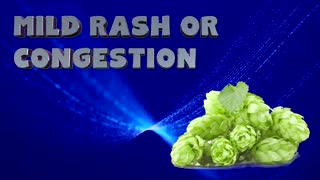Premium Only Content

How The EndoCannabinoid System Controls Stress And Anxiety | Cannabinoid Tone In The Brain | FPS #6
Endocannabinoids - cannabinoids made in the body, by the body - are a Hot Topic in Neuroscience & Beyond - with Western & integrative medicine coming to embrace the role of these important compounds, the EndoCannabinoid system is emerging as a therapeutic target for treatment of several psychiatric disorders. However, endocannabinoid system research is limited by scientists' ability to translate these groundbreaking research discoveries into clinical treatments, mostly due to a lack of understanding of how this system is involved with basic physiological processes, including stress & anxiety.
In this episode, Dr. David Marcus - A recent graduate of the Neuroscience PhD Program at Vanderbilt University & 1st author of this episode's manuscript - joins us to speak about the recently published manuscript, "Endocannabinoid Signaling Collapse Mediates Stress-Induced Amygdalo-Cortical Strengthening", published in the journal Neuron.
https://www-sciencedirect-com.proxy1.lib.uwo.ca/science/article/pii/S0896627319310906
Highlights
• The BLA-plPFC circuit is engaged by stress exposure and its activation is anxiogenic
•Stress enhances glutamate release in a reciprocal BLA-plPFC-BLA subcircuit
•BLA-plPFC glutamatergic drive is constrained by multimodal 2-AG signaling
•2-AG signaling collapse mediates stress-induced circuit strengthening and anxiety
Abstract
Functional coupling between the amygdala and the dorsomedial prefrontal cortex (dmPFC) has been implicated in the generation of negative affective states; however, the mechanisms by which stress increases amygdala-dmPFC synaptic strength and generates anxiety-like behaviors are not well understood. Here, we show that the mouse basolateral amygdala (BLA)-prelimbic prefrontal cortex (plPFC) circuit is engaged by stress and activation of this pathway in anxiogenic. Furthermore, we demonstrate that acute stress exposure leads to a lasting increase in synaptic strength within a reciprocal BLA-plPFC-BLA subcircuit. Importantly, we identify 2-arachidonoylglycerol (2-AG)-mediated endocannabinoid signaling as a key mechanism limiting glutamate release at BLA-plPFC synapses and the functional collapse of multimodal 2-AG signaling as a molecular mechanism leading to persistent circuit-specific synaptic strengthening and anxiety-like behaviors after stress exposure. These data suggest that circuit-specific impairment in 2-AG signaling could facilitate functional coupling between the BLA and plPFC and the translation of environmental stress to affective pathology.
Keywords
2-arachidonoylglycerol, glutamate, prefrontal cortex, anxiety, cannabinoid, amygdala, stress, optogenetics, cannabis, post traumatic stress disorder.
Interested in cutting-edge neuroscience research? Tired of exciting information being hidden behind those pesky paywalls? Introducing the First-Person Science Podcast: The 1st and only podcast dedicated to in-depth exploration of neuroscience research articles with first-hand perspectives and narratives from the authors themselves.
FPS introduces a new way to discover and engage with neuroscience research. We aim to break-down barriers to science communication by explaining jargon and complicated concepts in entertaining and succinct ways in a ‘journal club’ style to encourage collaboration and discussion between scientists and the public, alike.
In each episode, a scientist joins the show to speak about their recent ‘first-author’ manuscript. We walk viewers through each figure “1 bar graph at a time” using panel-to-panel summaries with video and visual illustrations to aid understanding of complex topics. View all figures and aspects of the research articles on our YT channel: youtube.com/firstpersonsciencepodcast
Listeners can expect to learn cool facts and get a general background for everything related to the episode's journal article through a visually immersive ‘journal club’ approach to the podcast, Ft. narratives and first-person perspectives from the authors/scientists themselves. It's a fine line to manage, but we're doing our best! And the more feedback from people from all levels of background/understanding, the better!
Listen to our podcast on itunes, spotify, or wherever you get your podcasts. Direct audio download link: https://firstpersonscience.podbean.com
RSS Feed: https://feed.podbean.com/firstpersonscience/feed.xml
Follow us on Twitter to stay up to date on the latest research: @firstpersonsci
Facebook: https://www.facebook.com/First-Person-Science-106183617589132/
Instagram: https://www.instagram.com/firstpersonsciencepodcast/
Interested in increasing exposure for your published research? Curious about becoming involved with the show? Email us: firstpersonsciencepod@gmail.com.
Produced by Roger Hudson, PhDc
-
 1:00:52
1:00:52
dogtown777
3 years agobrain stress relief
71 -
 0:37
0:37
KMGH
4 years agoDealing with stress & anxiety
98 -
 0:29
0:29
IOL-IndependentOnline
3 years agoHow to boost your body’s immune system and reduce stress & anxiety with Inzpire Health
25 -
 10:22
10:22
trobinson369
3 years ago $0.02 earnedTOP 15 HERBS for ANXIETY/STRESS - natural treatments for stress & anxiety
89 -
 19:37
19:37
Neil McCoy-Ward
5 hours ago🚨 The CRAZIEST Moments From Davos 2025... ! 🔥
3353 -
 2:57:43
2:57:43
Benny Johnson
4 hours ago🚨BREAKING: Trump Live Right Now in North Carolina Disaster Area! Real Leader | Trump Visiting LA
93K107 -
 58:14
58:14
Winston Marshall
4 hours agoHollywood Insider SPEAKS OUT On Woke Hollywood & Trump’s A-List Allies | Andrew Klavan
28.4K19 -
 44:59
44:59
Game On!
3 hours ago $0.90 earnedTom Brady's BIG GAMBLE! Pete Carroll new head coach of the Raiders! | Crick's Corner
8.98K -
 17:26
17:26
Tactical Advisor
4 hours agoEverything New From Primary Arms 2025
10.2K2 -
 1:55:32
1:55:32
The Charlie Kirk Show
3 hours agoThe Greatest Pro-Life President + AMA | Gingrich | 1.24.2025
81.4K26